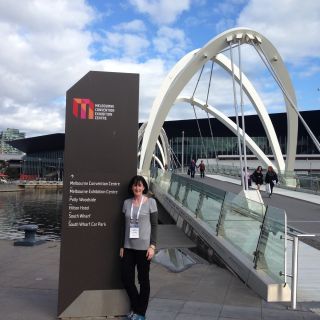Revisiting the Asia-Pacific Prostate Cancer Conference

In the December edition of this newsletter, I reported on my attendance at the Asia – Pacific Prostate Cancer Conference which ran from 31 August to 3 September 2016 at the Melbourne Convention and Exhibition Centre in Australia. My column focused on some of the sessions of particular interest to me, from the medical stream of the multidisciplinary programme.
This column revisits the same conference, this time reporting on some of my key learning’s from the excellent nursing and allied health programme.
‘Let’s talk about Gay Sex’ was a very informative and thought-provoking session, exploring gay and bisexual (GB) men’s

Sue at the Convention Centre in Melbourne
experience of prostate cancer. The session was delivered by Ms. Janette Perz on behalf of University of Western Sydney Professor Jane Ussher, who was unable to attend the conference at the last minute. The content focused on the findings of an Australian mixed method research project funded by the Prostate Cancer Foundation of Australia. This charitable organisation is a leader in funding research into the impacts of prostate cancer on GB men and in publishing information specifically for this group. The research findings indicate that GB men have significantly higher psychological distress and prostate cancer anxiety compared to heterosexual men. GB men also reported being less satisfied with the prostate cancer-related psychological and medical care they received than heterosexual men (70% GB men were happy with their care, compared to 85% heterosexual men).
Prof. Jane Ussher alerted health professionals as to how the differences in the relationship contexts of GB men affect the care and support they may require, following a prostate cancer diagnosis. Key messages from this session included:
- GB men are more likely to be in newer relationships, of less than 10 years duration, than heterosexual men. They are also more likely to have had more than two partners in the previous six months.
- GB men value youth. The speaker advised that it takes confidence to age in the gay community and that GB men often felt their prostate cancer treatments had ‘aged them’ before their time. For some GB men, loss of sexual functioning meant loss of functioning in their community.
- Prostate cancer treatments like radical prostatectomy challenged gay identity as well as masculine identity because of ejaculate loss. Ejaculation is an important measure of pleasure from sexual activity for GB men.
- Urinary incontinence is more worrying for GB men. It appeared to create more situations of embarrassment particularly in the context of casual relationships.
- Both GB and heterosexual men felt that the loss of penile length associated with radical prostatectomy was not really known in advance. GB men appeared to find this treatment complication especially worrying.
- GB men commonly redefined sex after prostate cancer treatments. They identified sex was not solely defined by ‘penetration’, and reported more use of sexual aids and experimentation to reclaim their sexuality. GB men also demonstrated an ability to redefine intimacy. An observation was made that heterosexual men may benefit from widely adopting similar strategies.
- Both GB and heterosexual men reported a loss of desire associated with a prostate cancer diagnosis. Both experience changes in erectile function and strength of orgasm plus sexual pain related to orgasm. GB and heterosexual men reported a threat to their masculinity with emotional consequences, including depression, observed in both groups. Heterosexual men tend towards being more resigned to the changes in their sexuality, rationalising that they ‘were getting old anyway’ or that ‘their sex life was good, but now it’s over’. These sentiments are not similarly expressed by GB men, with this group more commonly tending to resist and renegotiate the changes.
As I left this session, I found myself reflecting on the care the urology team at my workplace deliver to men who identify as GB. Another session that had a similar effect on me was the breakfast workshop presentation on Motivational Interviewing, delivered by health and well-being training consultant, Genevieve Muir-Smith. She challenged us to consider how we engage and communicate with our patients in a manner that will motivate them for change, rather than against it.
An example of a prostate cancer-related scenario where motivational interviewing techniques could prove useful would be a therapeutic interaction with an overweight man on androgen deprivation therapy who is resistant to engaging in any form of exercise.
Muir-Smith outlined how the use of a decisional balance tool can help a patient evaluate their situation in a supportive, non-threatening way. The tool encourages the patient to examine their view on the pros and cons of their current behaviour (e.g. sedentary lifestyle) and a preferred behaviour (e.g. 15 minutes daily aerobic exercise). Thought-provoking questions include ‘What makes change difficult for you?’, ‘What would be difficult about undertaking the preferred behaviour (daily exercise)?’, ‘What would be good about making this change (daily exercise)? ’and ‘How would it feel to achieve this goal?’
The communication techniques suggested to deal with a patient’s resistance are well familiar to nursing: the use of open ended questions, reflective listening, summarising what has been said and affirming the positive change. The audience was reminded to ask questions that seek an emotional response not a factual one as people are more likely to change behaviours based on emotions.
This sense of reflection was a common experience for me at the end of many of the multidisciplinary presentations over the four-day conference, invigorating me in a way that only education and networking with like-minded experts can. With the EAU/EAUN Congress fast approaching I know many of you will be looking forward once again to the opportunity to explore your units urological practice in light of new evidence and the shared experiences of experts.
Sue Osborne, Urology Nurse, Auckland (NZ), sue.osborne@waitematadhb.govt.nz

